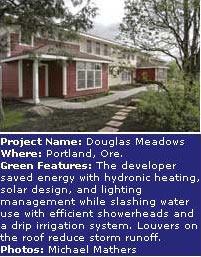Help Create Change Some developers have found that tenants who are used to living in substandard housing can unknowingly sabotage even the most efficient property. At Douglas Meadows in Portland, Ore., tenants who were used to electric heat complained that the hydronic heating system didn’t heat their apartments fast enough. A few even destroyed their thermostats. “People didn’t always respond well to things that were new to them. They thought something was faulty when it didn’t work the way they were used to,” says construction coordinator Michael Prothe of the Portland Development Commission.
Jackson Street Village in St. Paul had similar problems. “People would crank the heat up to 90 degrees, then open all the windows,” recalls the Wilder Foundation’s Tom Schirber. Tenants also turned off the ventilation system, which is needed in a tight home to prevent the build-up of moisture and pollutants. Schirber says that in another Wilder project built with structurally engineered panels, tenants were hanging pictures on the 1-1/8-inch thick walls with 4-inch nails, which punched holes in the vapor barrier.
To counter such problems, some developers are supplementing their tenant education program with owners’ manuals that instruct tenants on their homes’ systems. Douglas Meadows’ manual will include an explanation of the heating system, so tenants will understand that the heat comes up more slowly than with electric heat. It will also explain the passive solar benefits of south-facing windows, which are lost when tenants put up drapes. The Wilder Foundation will supplement its manual with a cutaway of the wall, along with construction photos that demonstrate the structural systems.
Sometimes it helps to go beyond manuals to something more tangible. Wilder holds classes for new tenants and is considering lock-out options on thermostats. And Schirber even gives new tenants a box of 1-inch screws as “a housewarming present.”
